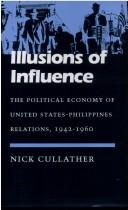Check nearby libraries
Buy this book

Exploring the inner workings of the "special relationship" of the United States and the Philippines, this book challenges the accepted view that portrays the relationship as one of colonial domination and exploitation, with the United States controlling the Philippines for economic and geopolitical gain.
Using Philippine sources released since the 1986 revolution and recently declassified U.S. records, the author finds instead a complex structure that allowed both nations to attain their most cherished goals while sacrificing interests of lesser importance.
The United States obtained a military base complex it considered essential for the projection of American power in Asia. In return, the Philippines received a favored position in the American market and billions of dollars in economic and military aid. The Philippine elite manipulated the relationship and their nation's economy, creating a "crony capitalist" system that protected a traditional social order from the demands of a restive peasantry and an emerging Filipino-Chinese middle class.
Though U.S. policy made crony capitalism possible, it could also threaten it, and Filipinos learned how to steer U.S. policy along lines advantageous to themselves by resorting to nonconfrontational resistance - thwarting development plans, harassing American businesses, diverting aid, restricting trade, and making military bases the target of nationalist attacks.
The author rejects the myth that U.S. policy supported economic exploitation, finding instead that American business interests were docile bystanders sacrificed to U.S strategic imperatives. But American policymakers tolerated the manipulations that allowed Filipino oligarchs to plunder the economy and reinforce their political and economic dominance.
The book thus forces us to rethink conventional assumptions about dependent relationships, and shows that generalizations about client states need to be qualified by considerations of culture and political economy.
Check nearby libraries
Buy this book

Showing 1 featured edition. View all 1 editions?
| Edition | Availability |
|---|---|
|
1
Illusions of influence: the political economy of United States-Philippines relations, 1942-1960
1994, Stanford University Press
in English
0804722803 9780804722803
|
aaaa
Libraries near you:
WorldCat
|
Book Details
Edition Notes
Includes bibliographical references (p. [232]-255) and index.
Classifications
External Links
The Physical Object
ID Numbers
Community Reviews (0)
Feedback?History
- Created April 1, 2008
- 9 revisions
Wikipedia citation
×CloseCopy and paste this code into your Wikipedia page. Need help?
| July 14, 2024 | Edited by MARC Bot | import existing book |
| October 4, 2021 | Edited by ImportBot | import existing book |
| November 17, 2020 | Edited by MARC Bot | import existing book |
| August 18, 2020 | Edited by ImportBot | import existing book |
| April 1, 2008 | Created by an anonymous user | Imported from Scriblio MARC record |









